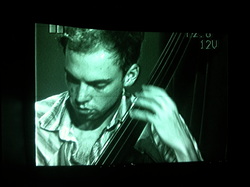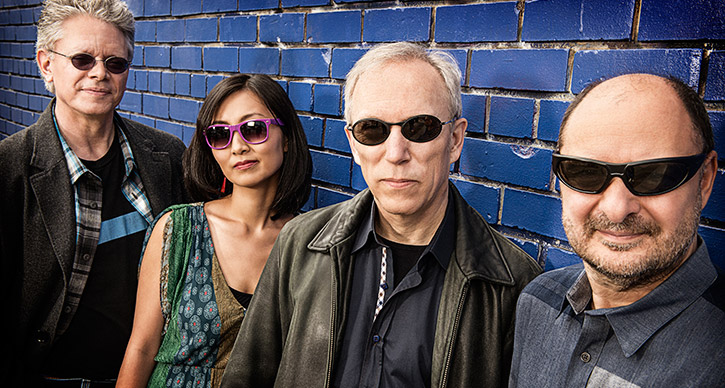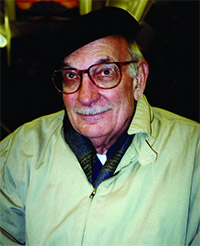UMS Artists In Residence: Meet Ben Willis
Editor’s note: UMS is in the second season of its Artists in “Residence” program. Five residents from across disciplines take residence at our performances throughout our season. We’ll profile each resident here on UMS Lobby.
Ben Willis is a bassist, improviser, and composer whose affinities lie in collaborative projects, new music, improvisation, and the merging of cross-disciplinary elements. He released an album of solo double bass compositions, Egret/Flatlander, in summer of 2015. His jazz-rock band, Lovely Socialite, will be releasing their second album, Toxic Consonance, in fall of 2015. He lives in Ypsilanti, MI, and performs often throughout the midwest.
UMS: Tell us a little about yourself and your background in the arts.
 Ben Willis: I did my undergraduate degree in classical performance, and have been playing in orchestras since middle school. While in Madison, WI, I was able to meet a community of musicians interested in making original, creative music. Though I’ve always kind of kept a foot in the classical world, after college I began playing a lot with my own bands, playing as a sideman for singer-songwriters, and working with artists of other performing arts (dance, theater, video) to develop new works. I came to the University of Michigan in 2012 to study improvisation, in order to extend my collaborative tool set. I’ve always been the kind of person who wants to do everything, so while I’m a performing artist by training/trade, I also try to work in other mediums (drawing, writing) as a hobbyist. I’m interested in being able to at least appreciate all art forms.
Ben Willis: I did my undergraduate degree in classical performance, and have been playing in orchestras since middle school. While in Madison, WI, I was able to meet a community of musicians interested in making original, creative music. Though I’ve always kind of kept a foot in the classical world, after college I began playing a lot with my own bands, playing as a sideman for singer-songwriters, and working with artists of other performing arts (dance, theater, video) to develop new works. I came to the University of Michigan in 2012 to study improvisation, in order to extend my collaborative tool set. I’ve always been the kind of person who wants to do everything, so while I’m a performing artist by training/trade, I also try to work in other mediums (drawing, writing) as a hobbyist. I’m interested in being able to at least appreciate all art forms.
UMS: Can you tell us a little about your creative process? Where can we find you working on your art?
BW: As an improviser, a lot of ideas kind of build gradually over time–I find in performance that sometimes things re-surface, and it’s helpful to isolate things that don’t feel improvised anymore as their own things. Another way I like to work, since most of my work is collaboratively generated, is to choose the people I’d like to work with first, and then develop the art spontaneously through the process of meeting/playing with others.
UMS: What inspires your art? Can you tell us about something you came across lately (writing, video, article, piece of art) that we should check out too?
BW: I am constantly inspired by my friends and collaborators. The best thing about being an artist is getting to know other artists, experiencing their process, and developing years-long artistic relationships. On another front, I’ve just recently become very interested in comics and graphic storytelling–some favorite books I’ve just read in that vain in the past few months are Charles Burns’s Black Hole, Jules Feiffers’s Kill My Mother, and Jodorowsky/Moebius’s The Incal. It’s really inspiring to experience works that make essential use of the combination of mediums (and the static experience of the printed page–so much of how films are made are taken from the style of comics these days, but there are a lot of things that the comic medium can just do better). I’ve also been re-reading some of my favorite Haruki Murakami books. And if you haven’t seen Oskar Schlemmer’s theater works/costume designs, do yourself the favor of going down that Google wormhole sometime.
UMS: Are you engaged with the local arts community? Tell us about groups or events that we should know about.
BW: I joined the Arbor Composers Collective in 2012, an ensemble started by composer/trumpeter Derek Worthington. That has been a great resource for developing new ideas and working with great musicians, and we present performances regularly. Our next performance is at Edgefest, presented by Kerrytown Concert House on October 21st. I also perform and have had a hand in booking many performances at Canterbury House, another great resource/platform in Ann Arbor for creative music. In the last year, I’ve been involved in the Radical Sounds Detroit series, which is curated by veteran Detroit composer/performer James Cornish, and presented by Spread Art at Detroit Contemporary. I’ll be guest curating the event on November 21st. I also teach private lessons, do workshops/sectionals at schools, and play in several bands that perform in the area, including Battleshags, The Great Collapsing Hrung, and Saajtak. You can check out a complete list of my upcoming performances.
UMS: Which performances are you most excited about this season and why?
BW: Sankai Juku’s UMUSUNA looks bonkers. I can’t wait. I’ve also been a longtime fan of Shara Worden, and more recently Tanya Tagaq, so I’m very much looking forward to their performances.
Interested in more? Watch for more artist profiles on UMS Lobby throughout this week.
Interview: Garrett Schumann interviews Composer George Crumb
Photo: Kronos Quartet. Photo by Jay Blakesberg.
Known for its renegade spirit, the Kronos Quartet will perform two different programs on January 17 and 18, 2014 in Ann Arbor. The first program will include George Crumb’s epic work Black Angels, a response to the agony of the Vietnam War,
Our regular Lobby contributor Garrett Schumann sat down for an interview with George Crumb. Read on to learn more about the composer’s influences, his life in Ann Arbor as a doctoral student, and the debut performance of Black Angels in Rackham Auditorium.
Garrett Schumann: You describe Black Angels (1970) as a reaction to the Vietnam War, and I’m curious how the meaning of the piece to you has changed or persisted in the 43 years since you wrote it?
George Crumb: Well, Black Angels was played to pieces, as you probably deduced. It’s more than 40 years old now, but I remember that it was a very difficult piece to write. As far as it relates to the Vietnam War, I had to discover that myself because I didn’t set up to write a political piece. I think that the upset in the world found its way into the music, which happens so frequently.
There are many works throughout music history that are reactions to political events, but in this case it kind of crept up on me. At a certain point, I realized that it was becoming a reflection of a lot of the anxiety and uncertainty of those days. It was a pretty bleak period.
And that coincided with all of the protest movements around the country, which kind of led to a whole new kind of America.
GS: In 2008, the New York Times reviewed a Kronos Quartet performance of Black Angels, and commented that the piece inspired David Harrington, the Kronos Quartet violinist, to form the group. I know Kronos Quartet started playing Black Angels very soon after they formed, and they have performed the piece a lot, and will perform it as part of their upcoming performance in Ann Arbor in January. I’m curious what you think their experience with the piece brings to their performance of it.
GC: It’s interesting, the Kronos Quartet quickly became well-known, but I’ve never worked with them. Most quartets would ask me to sit in and listen to their performance. I didn’t sit in on any rehearsals before they began playing it, so what they brought to it was entirely their own. It was interesting to me to see how a group of musicians would face all of the problems in the piece without my intervention.
And by the same token, I was never been in on the recording sessions. There have been quite a number of Black Angels recordings, and I sat in on many of them, but not in this case.
So those are interesting things for me, and another thing is the way they kind of superimpose a theater gesture on top of the score itself. Their interpretation is a little freer than some of the quartets who have done the work. I think the music allows room for varied interpretation, and they bring their own thing to the music.
GS: There’s a lot of imagery built into the way you write music, so do you see a theatrical interpretation as a sort of extension from that visual aspect that’s embedded in your music?
GC: Yes, I think that sort of thing seems a natural way to approach my music. There are no instructions for that in my score of Black Angels, any kind of special theater effect, but I would like to see more of that in music generally. I’ve always felt that traditional music had that curious, almost poetic, thing built into it. And the musicians have to move. In a way, they’re dancing with their instruments. This sort of thing is part of music, so I can understand how performers sometimes might even want to accentuate that side of it.
GS: What was the impulse, early on in your career, or maybe even before you knew you wanted to compose, to manipulate instruments in unusual ways, to create different sounds?
GC: Many composers had a big influence on my music. One was Béla Bartók, I felt the real power of his influence when I, myself, was a graduate student in Ann Arbor. There’s also a little of Messiaen in my music, comes out in the cello solo part of Black Angels. There’s a little Messiaen-ic sound. It’s an unconscious borrowing, but I recognize it was a borrowing later on. It’s there.
GS: What are your recollections of being here [Ann Arbor] as a doctoral student and has your experience here influenced you at all beyond your education?
I enjoyed so much studying with Ross Lee Finney, he was my only teacher during those years. He really insisted on the clarity of notation, and I’ve never had anyone else I’ve worked with who placed as much stress on that aspect. Another good thing about it is that there were so many students in the graduate program; you learn from your classmates just as much as you do from your teachers.
GS: When you wrote Black Angels, you used folk songs, which are heavily loaded as a symbol of American identity. Do you think it’s important for American composers to address those aspects of national identity directly?
GC: Well, I think it’s a strong element in music generally, and an important thing for a composer to have. If you consider a composer like Stravinsky, all the melodic elements are derived from Hungarian folk songs. And it’s hard to think of Brahms and Beethoven without all of the built-in references to German folk songs.
Black Angels quotes other composers, and it has this quasi-antique music. It’s really a pastiche. These materials can be used by composers to add a kind of depth or perspective. It’s like two different worlds coming together.
GS: Is there something you would like people who haven’t heard Black Angels before to take with them into the concert hall?
GC: I don’t think I’m able to really verbalize that very well. And I guess what the composer should say is: Listen with open ears and try to fit it together. There are the qualities of anguish and love, even, pain; it’s a mixture of all the things our world is made of.
GS: Is there anything else you would like to add?
GC: I wanted to be sure to mention the Stanley Quartet, who did the first performance of Black Angels in Ann Arbor. I had just gotten a commission from them to do a quartet, and I said to myself, I want to write a quartet that’s unlike any other quartet. I want to do something a little original. And I didn’t realize it then how far I would push.
I think they must’ve been totally surprised when they got the score. They finished the piece, read it through. I went out to Ann Arbor a couple days early to make some explanation. They had a million questions. There were different ways of playing their instruments, there were unconventional ways they had to produce the sound.
They hadn’t played much contemporary music, so they were willing to do anything I wanted. And I ended up conducting, can you imagine? I felt like a fool conducting a string quartet, but it helped them keep it all together, and they did a marvelous performance.
There was quite an enthusiastic reception. I think they [the audience] were probably at least in their sixties, verging on seventies, so I’m sure that none of them are alive now. But they sure came through for me and they were really willing to exert themselves and put this thing together, which amazed me.
Interested in learning more? Read our interview with Kronos Quartet’s David Harrington, who describes Black Angels as the piece of music that inspired him to start the group.




